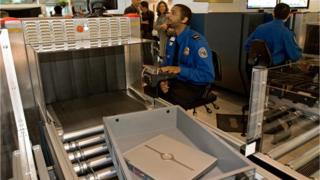 Image copyright
Image copyright
Getty Images
The new directive is expected to affect airlines from 13 countries
The US is banning electronic devices from cabin baggage on flights from eight mainly Middle Eastern and North African countries.
A US government source told the BBC that the measure would affect nine airlines operating out of 10 airports.
US media reported the order was sparked by intelligence gathered overseas.
It will reportedly include all large electronic devices such as laptops, tablets cameras, DVD players and electronic games, but not phones.
The Department of Homeland Security (DHS) declined to comment on the issue but is expected to make an announcement on Tuesday.
The Transportation Security Administration (TSA), which is part of Homeland Security, also refused to comment.
A formal list of the airlines affected has yet to be released, but an official speaking to the Associated Press (AP) said it would apply to the following 10 airports in eight countries:
- Queen Alia International, Amman, Jordan
- Cairo International Airport, Egypt
- Ataturk Airport, Istanbul, Turkey
- King Abdulaziz International, Jeddah, Saudi Arabia
- King Khalid International, Riyadh, Saudi Arabia
- Kuwait International Airport
- Mohammed V International, Casablanca, Morocco
- Hamad International, Doha, Qatar
- Dubai International, United Arab Emirates
- Abu Dhabi International, United Arab Emirates
Officials said the ban had no end date. AP reported that airlines would not be officially informed of the ban until 03:00 ET (07:00 GMT) on Tuesday.
But Royal Jordanian Airlines tweeted on Monday that it would ban passengers from carrying on most electronics to and from its North American flights, CNN first reported.
The tweet was later deleted.
Image copyright
Getty Images
The Jordan-based carrier said that starting on Tuesday, it would only allow phones and medical devices on its flights. All other electronics would be “strictly prohibited”.
The airline said that laptops, tablets, DVD players and electronic games must be checked with baggage.
The new rule will affect Royal Jordanian flights to New York, Chicago, Detroit and Montreal.
A matter of trust – James Cook, BBC North America correspondent
In February 2016 an aircraft operated by the Dubai-based carrier Daallo was damaged by an explosion shortly after take-off from the Somali capital, Mogadishu.
Investigators said a passenger who was sucked out of the plane had been carrying a laptop bomb. The pilot managed to land and the alleged bomber was the only fatality. Had the device gone off at cruising altitude the plane would almost certainly have been destroyed.
The Islamic militant group al-Shabab, which is linked to al-Qaeda, claimed that it was responsible and the possibility of further such attacks is apparently what is now concerning American spies.
But, as ever with matters of intelligence, officials are reluctant to go into detail about exactly why the ban is being proposed.
That means travellers being asked to trust the US government when it says that this inconvenience is vital for their own safety and – at present – trust is a commodity which is in very short supply.
What happened in Somali plane bomb?
Homeland Security Secretary John Kelly reportedly called congressional lawmakers over the weekend to explain the travel security issues that prompted the electronics ban, a congressional aide briefed on the discussion told the AP news agency.
The new ban has been under consideration for several weeks, according to US media.
Africa affected by US electronics flight ban

